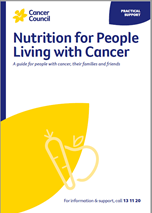- Home
- About Cancer
- Cancer treatment
- Chemotherapy
- Managing side effects
- Constipation or diarrhoea
Constipation or diarrhoea
Some chemotherapy drugs, pain medicines and anti-nausea medicines can cause constipation or diarrhoea. If your bowel habits have changed during your treatment, talk to your doctor, pharmacist or nurse.
For some people, there will be ongoing bowel problems after cancer treatment has finished. See the tips below for ways to manage bowel issues at home. Also, see Nutrition and cancer for information on staying well nourished and meal ideas.
Learn more about:
- How to manage diarrhoea
- How to manage constipation
- Podcast: Appetite Loss and Nausea
- Video: How to eat well after a cancer diagnosis
How to manage diarrhoea
- Choose bland foods such as clear broth, boiled rice or dry toast. Avoid spicy foods, wholegrain products, fatty or fried foods, rich sauces, and raw fruits or vegetables with skins or seeds.
- It may help to eat foods that are high in soluble fibre such as oats, white bread, white rice, bananas, nuts and pasta.
- Limit alcohol, fruit juice, soft drinks, strong tea or coffee, and foods containing artificial sweeteners, as these stimulate the bowel.
- Drink plenty of water to help replace fluids lost through having diarrhoea.
- Talk to your treatment team. They may change the drugs or doses you are on or suggest other solutions.
- If diarrhoea is severe or ongoing, let your treatment team know. It can cause dehydration and you may need to go to hospital.
How to manage constipation
- Eat more high-fibre foods, such as wholegrain bread and pasta, fruits and vegetables, bran, nuts and legumes (e.g. baked beans or lentils).
- If you are having treatment for bowel cancer, ask your treatment team if there are any foods you should or shouldn’t eat to help avoid constipation.
- Drink plenty of fluids, both warm and cold. Prune, apple or pear juice can work well.
- Do some light exercise, such as walking.
- Ask your doctor about using a laxative, stool softener or fibre supplement.
- Avoid using medicines delivered through the rectum (e.g. enemas or suppositories) as they may cause infection.
- Let your treatment team know if you have constipation for more than a couple of days. They will be able to help.
→ READ MORE: Thinking and memory changes
Podcast: Appetite Loss and Nausea
Listen to more episodes from our podcast for people affected by cancer
Video: How to eat well after a cancer diagnosis
A/Prof Kate Mahon, Director of Medical Oncology, Chris O’Brien Lifehouse, NSW; Katherine Bell, Dietetics Department, Liverpool Hospital, NSW; Brigitta Leben, Dietetics Department, Liverpool Hospital, NSW; Sophie Michele, 13 11 20 Consultant, Cancer Council SA; Dr Jess Smith, Medical Oncologist, Macquarie University Hospital, NSW; Karene Stewart, Consumer; Julie Teraci, Clinical Nurse Consultant, Skin Cancer and Melanoma, Cancer Network WA.
View the Cancer Council NSW editorial policy.
View all publications or call 13 11 20 for free printed copies.
